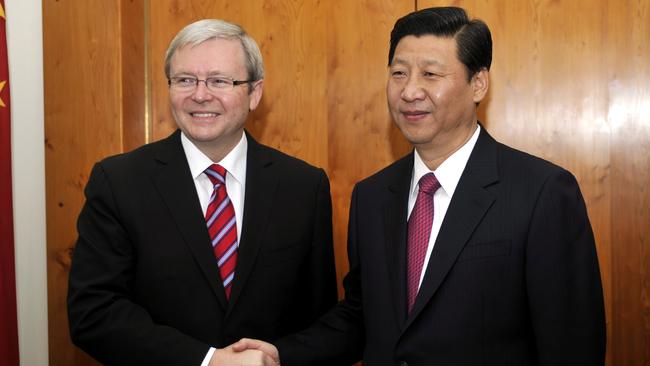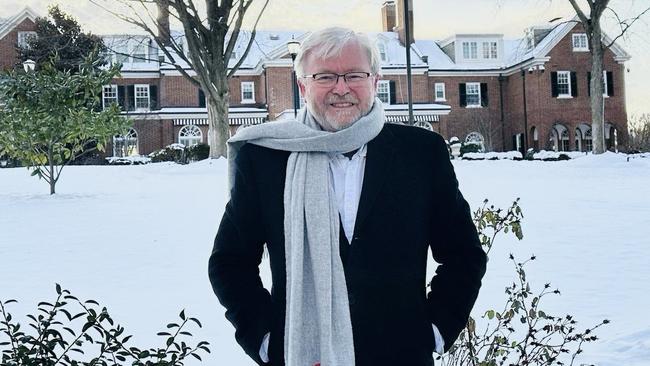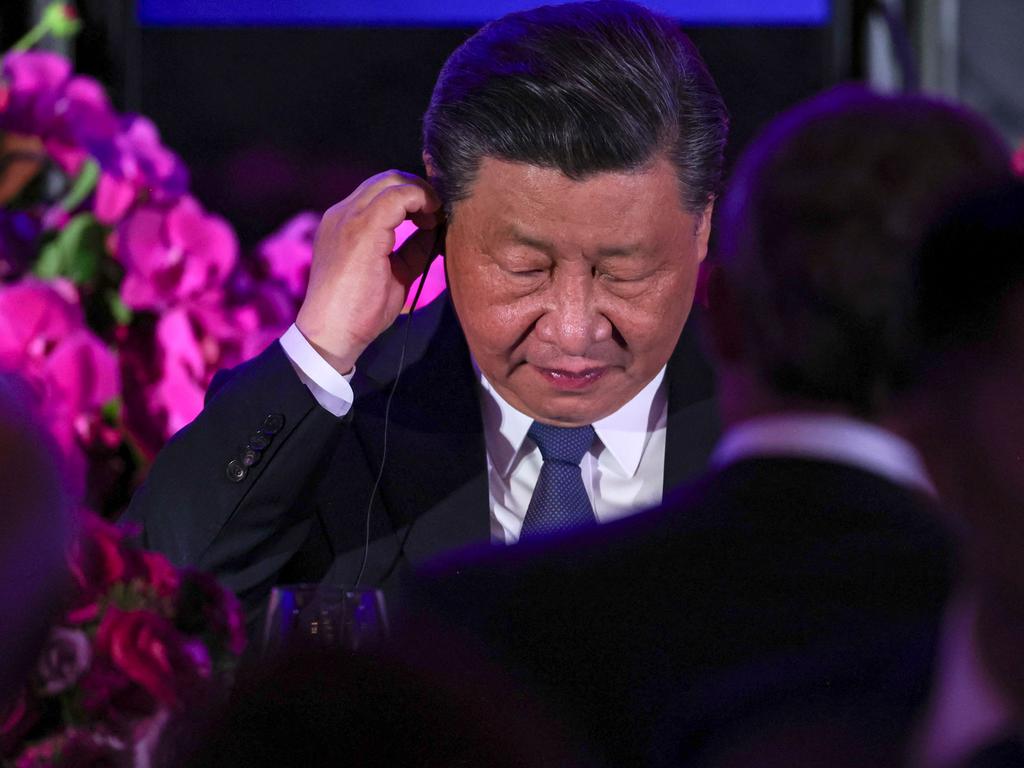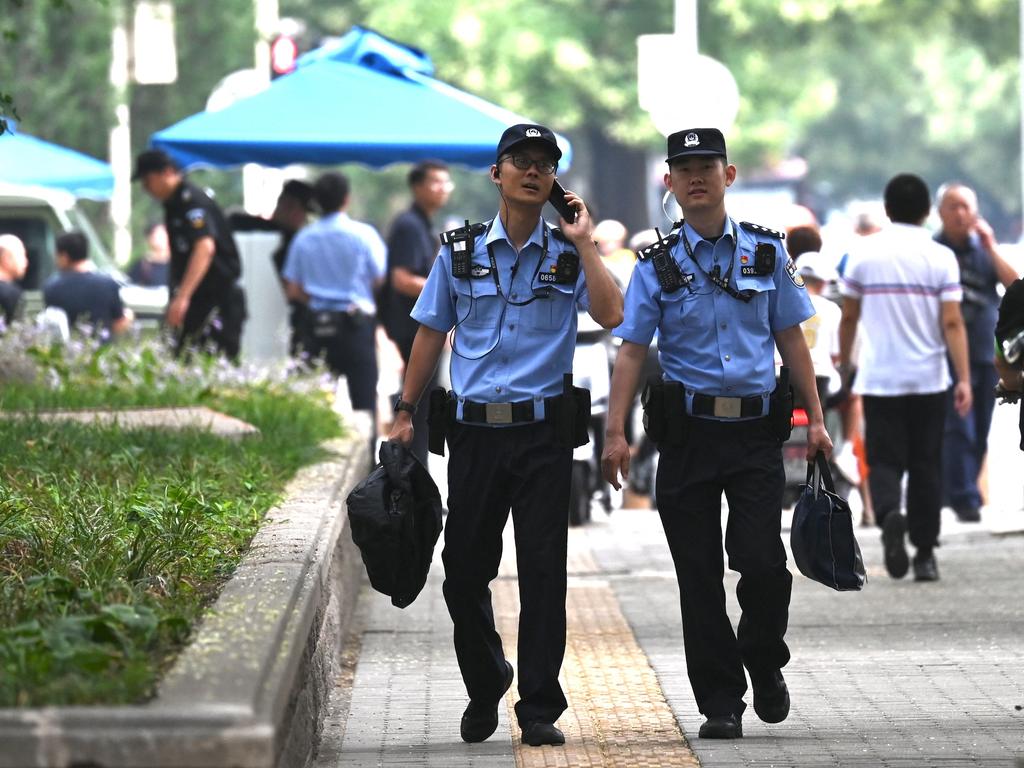Kevin Rudd calls for vigilance to deter Xi Jinping’s threat to global order
Kevin Rudd’s new book exploring Xi Jinping’s ideological mission warns the Chinese threat to the existing international order is peaking and a post-Xi world could see Beijing shift back to the political centre.

Kevin Rudd says the world must ride out the threat posed by Xi Jinping through a combination of deterrence and diplomacy, avoiding a conflict that could redefine global politics, up-end the US-China relationship and generate “death and destruction at an unimaginable scale.”
Australia’s top diplomat in Washington is also championing realism towards China’s stabilisation of ties with the US and its allies, arguing this represents merely a “shift in tactical diplomacy” as Beijing continues to press its challenge to the existing international order.
While it is unusual for an Australian ambassador to so publicly examine a leading international figure such as Xi Jinping, Dr Rudd has a unique vantage point as a former prime minister, foreign minister, diplomat and world expert on Chinese affairs.
In his new book, “On Xi Jinping” Dr Rudd argues that Mr Xi has changed China through the power of his own ideology and individual political leadership, offering an “alternative authoritarian development model for the world.”
Mr Xi’s objective is to “change the international order itself, underpinned by an increasingly powerful China as the emerging geopolitical and geo-economic fulcrum of that order.”
Dr Rudd also says that Beijing remains “locked in a death struggle with the United States to secure the commanding heights across all critical domains of technology, most crucially artificial intelligence.”

The warning comes amid a normalisation of relations between Canberra and Beijing, with China removing the final trade obstacle this month by resuming the live lobster trade after Australian exporters in 2020 were hit with restrictions costing $20bn annually.
The deal was clinched at last week’s ASEAN summit by Anthony Albanese and Chinese Premier Li Qiang – their second meeting this year. The Prime Minister said “a series of regular meetings between ministers” had resumed, with Jim Chalmers in September becoming the first treasurer in seven years to visit China and an Australian parliamentary delegation visiting China this week.
In the 604-page book based on his doctoral thesis and published by Oxford University Press, Dr Rudd makes the case that China’s threat to the global system will reach its pinnacle during the Xi Jinping era – concluding the danger period is now.
Should the world successfully navigate this stretch, Dr Rudd suggests China will return to the political centre because of the harsh toll arising from the Chinese leader’s insistence on strict adherence to his own interpretation of Marxist ideology.
Dr Rudd argues that Mr Xi has taken Chinese politics since 2012 to the “Leninist left” by reasserting the power of the leader, while shifting economic policy since 2017 to the “Marxist left” by elevating the primacy of state planning over market forces.
In addition, Mr Xi was moving Chinese foreign policy to the “nationalist right” by promoting Chinese civilisational centrality and a grievance culture over the West’s past occupation and containment of China.
Dr Rudd warns that a successful push to take Taiwan would usher in a period of US global decline and make Mr Xi’s position “unassailable.” He also says there is debate in China about integrating “nuclear forces into regional war-fighting scenarios given advances in US ballistic missile defence technology.”
“Xi’s period in office likely represents the period of peak danger on the possibility of war over Taiwan,” Dr Rudd says. “Unless Xi can hold on for another twenty years or more, China, on balance is less likely to become more ideologically extreme once he goes.”
Dr Rudd says China “would broadly welcome a return to the centre” after Mr Xi, saying that the challenge for the wider world “is to effectively navigate the Xi Jinping era through a combination of deterrence and diplomacy, without recourse to crisis, conflict and war.”
A war, “whatever its outcome, would generate death and destruction at an unimaginable scale.”
“It would also redefine Chinese, American and global politics and geopolitics in deeply predictable yet indelible ways,’ Dr Rudd says. “And the world would never be the same again.”
If a policy of deterrence was successful and Mr Xi was prevented from taking Taiwan, Dr Rudd says it would be “highly unlikely” his successor would then seek to claim the island.
Making the case for why China would shift to the centre after Mr Xi’s departure, Dr Rudd writes that the Chinese leader’s “ideological onslaught” had come at a price for the Chinese people, the Chinese economy and Beijing’s global standing. “The damage has been real and, in many areas, seems unrecoverable,” he says.
The emergence of the Quad and the AUKUS agreement along with enhanced security co-operation between the US, Japan and South Korea, rejuvenation of the US-Philippines security alliance and hardening of European strategy towards China are all cited by Dr Rudd as major foreign policy losses for China.
“Xi’s embrace of Putin in a strategic partnership with ‘no limits’ on the eve of Russia’s invading Ukraine … has decisively affected baseline European sentiment towards China,” he says. “Furthermore, wolf warrior diplomacy writ large inflicted great damage on China’s global political standing with little gain.”
Mr Xi’s ideological approach to the Chinese economy meant industrialists and entrepreneurs now only saw “limited future opportunities in Xi’s China,” with many “declining to invest further.”
This is compounded by the “overall impact of slower growth on living standards and employment levels for the bulk of the working-age population.”
While Mr Xi “understood what his predecessors were seeking to do by leaving the democratic door open for the next generation,” Dr Rudd said that the Communist Party leader decided instead to “slam it tightly shut.”
“Xi, as an intelligent man … understood the costs of doing so. But he saw these social, economic, and international reputational costs as well worth paying to preserve the powers of the CCP for the long-term.”
Dr Rudd concludes that Mr Xi’s real enemy could be time, arguing the survival of his ideological vision would require him to “maintain power well into his nineties to appoint enough ideologically reliable younger cadres to enable his long-term political strategy to take root.”
“Prevailing in such a long-term struggle against the political, economic, and social forces arrayed against him will be a tall order indeed.”
Puncturing any long-term optimism about a strategic reset following the stabilisation of US/Chinese ties following the November 2023 summit between Mr Xi and Joe Biden, Dr Rudd promotes a realist view.
He says this was part of a tactical shift by Beijing to better “achieve changes in the international order that would advance China’s national interests and values.”
This became clear in the wake of China’s Foreign Affairs Work Conference in December 2023 which sketched out how the Chinese Communist Party would foster “new dynamics” in its relations with the world and help raise China’s international “influence, appeal and power to shape events to a new level.”
“Tactics may well have changed,” Dr Rudd says. “But China’s strategic intention, it seemed, had not.”






To join the conversation, please log in. Don't have an account? Register
Join the conversation, you are commenting as Logout